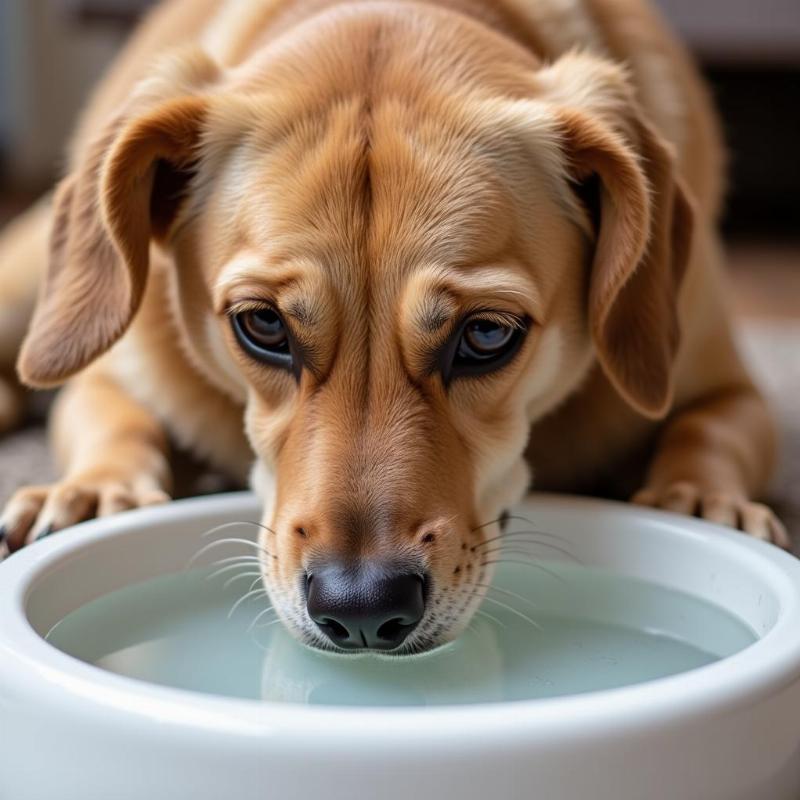Knowing whether or not your dog can drink water before surgery is a crucial part of ensuring their safety and a successful procedure. Many pet parents worry about their furry friend’s comfort and hydration, especially leading up to such an important event. This article addresses this common concern, providing clear guidelines based on American veterinary practices and offering helpful tips to prepare your dog for surgery.
Understanding Pre-Surgery Fasting for Dogs
Why do vets recommend withholding food and water before surgery? Anesthesia can temporarily suppress a dog’s natural reflexes, including the ability to swallow and protect their airway. If a dog’s stomach has food or water in it, there’s a risk of vomiting or regurgitation during or after the procedure. This can lead to aspiration pneumonia, a serious and potentially life-threatening complication where vomited material enters the lungs.
 Dog looking at water bowl
Dog looking at water bowl
How Long Should My Dog Go Without Water Before Surgery?
Your veterinarian will provide specific instructions regarding fasting, but general guidelines in the US typically advise withholding food for 8-12 hours before surgery. Water restrictions are usually shorter, often around 2-4 hours pre-surgery. This timeframe minimizes the risk of aspiration while ensuring your dog isn’t excessively dehydrated. Always follow your vet’s specific instructions, as they may adjust these guidelines based on your dog’s breed, age, health condition, and the type of surgery.
What Happens if My Dog Drinks Water Before Surgery?
Accidentally giving your dog water a few hours before their scheduled surgery isn’t necessarily a cause for panic, but it’s essential to inform your veterinarian immediately. They can assess the situation and determine the best course of action. Depending on the amount of water consumed and the type of surgery, they might postpone the procedure for a few hours or proceed as planned with additional precautions. Never try to induce vomiting unless instructed by your vet, as this can be dangerous.
Preparing Your Dog for Surgery: Hydration and Comfort
While following pre-surgery fasting guidelines is crucial, there are ways to ensure your dog remains comfortable and as hydrated as possible. Offer small amounts of water within the timeframe recommended by your vet. After the cutoff time, you can provide ice chips to lick, which can help soothe a dry mouth without significantly increasing stomach contents.
Post-Surgery Hydration for Dogs
After surgery, your veterinarian will gradually reintroduce water and food. They will monitor your dog closely for any signs of nausea or vomiting. Following their post-operative care instructions is vital for a smooth recovery.
Conclusion
Understanding and following your veterinarian’s instructions regarding food and water intake before surgery is essential for your dog’s safety and well-being. While pre-surgery fasting can seem concerning, it’s a critical precaution that minimizes risks and helps ensure a successful outcome. By working closely with your vet and following their guidance, you can help your furry friend through this process and support their recovery.
FAQ
-
Can puppies drink water before surgery? Puppies, due to their smaller size and higher metabolism, are more susceptible to dehydration. Your veterinarian will provide specific guidelines based on your puppy’s age and the procedure.
-
What if my dog sneaks a drink of water? Call your vet immediately and let them know how much water your dog drank.
-
Can my dog have ice chips before surgery? Consult your veterinarian, as some may allow small ice chips within a specific timeframe before the procedure.
-
How long after surgery can my dog drink water? Your vet will determine when it’s safe for your dog to resume drinking water, based on their recovery and the type of surgery.
-
What are the signs of dehydration in dogs? Signs include lethargy, dry gums, sunken eyes, and loss of skin elasticity.
-
Why is it important to inform my vet about any medications my dog is taking? Some medications can interact with anesthesia, so it’s crucial your vet has a complete picture of your dog’s health.
-
What can I do to comfort my dog before surgery? Spending quiet time with your dog, offering gentle pets and reassurances, can help ease their anxiety.
Related Articles
can i put chicken broth in my dogs food
About Beautdogs.us
Beautdogs.us is your leading online resource for comprehensive dog care information, breed-specific guidance, and product recommendations in the United States. Whether you’re a new dog owner or a seasoned enthusiast, we’re here to empower you with expert advice and valuable insights. We cover everything from nutrition and training to health and grooming, ensuring you have the knowledge to provide the best care for your canine companion. Contact us for personalized guidance: Email: [email protected], Phone: +1 501-555-7529.